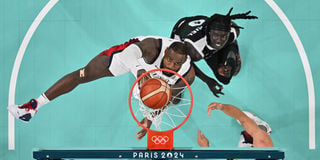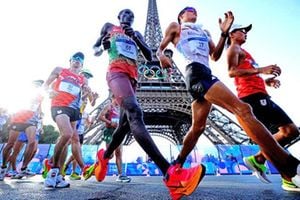
Lebron James of United States scores a basket as Wenyen Gabriel of South Sudan looks.
In Paris
Ajang Nyang is overcome with emotion and breaks down outside the Pierre Mauroy Stadium in Lille, Northern France, while holding the South Sudan flag.
The mother of four has travelled all the way from her adopted home in Boston, Massachusetts, in the United States of America, to cheer her home nation, South Sudan, as they make their Olympic Games basketball debut.

Lebron James of United States in action with Nuni Omot of South Sudan
Never mind that South Sudan lost their second Group ‘C’ preliminary round match 103-86 on Wednesday night to the mighty USA, a squad that boasts an embarrassment of talent spearheaded by decorated Los Angeles Lakers power forward Lebron James, a four-time winner of the US NBA League and a two-time Olympic gold medallist, and Golden State Warriors point guard Stephen “Steph” Curry, also a four-time NBA champion.

South Sudan fans Ajang Nyang (left) Nyibon Yongol and at the Pierre Mauroy Stadium in Lille ahead of their country's Olympic Games basketball match against the USA on July 31, 2024.
For Nyang, the mere fact that South Sudan is competing at the Paris Olympic Games is in itself a miracle.
“For us it’s a win just to qualify for the Olympics, and to come to play the best of the best, the United States of America… it’s a big win. Just for people to see this flag of South Sudan is a big win,” says Nyang while caressing the black-red-green-white-blue-yellow flag whose stripes bear a striking resemblance to Kenya’s standard.
“You people don’t know how we suffered… this is a win for us,” she adds, struggling to fight back tears as she reflects on the civil war that killed over 383,000 people in five years of fighting shortly after Juba gained independence from Khartoum in 2011.

South Sudan fans at the Pierre Mauroy Stadium in Lille ahead of their country's Olympic Games basketball match against USA on July 31, 2024.
South Sudan’s basketball team has been a hit at these Games, and some 9,000 kilometres away, the “Bright Stars” are uniting a nation that 14 years ago didn’t even exist.
They launched their campaign here with a 90-79 victory over Puerto Rico last Sunday before taking on the USA on Wednesday, July 31, night.
The rise of South Sudan’s basketball has been nothing short of meteoric, their first international tournament being the 2021 AfroBasket which they quickly followed up with an appearance at last year’s FIBA (International Basketball Federation) World Cup co-hosted by the Philippines, Japan and Indonesia.
Their major breakthrough was the 89-69 win over China in the group stage of that World Cup, which they followed up with wins over the Philippines and Angola to finish 17th.
“Resilient” is perhaps the word that best describes the South Sudanese players, many of whom were born refugees, some at Kenya’s Kakuma Refugee Camp, bravely making their way to the top US and Australian collegiate leagues.
Anuwa “Nuni” Omot’s parents Pillow and Kwot Omot fled from the civil war in Ethiopia, walking a treacherous 700 kilometres to Moyale on the Kenyan border but were arrested.
With the help of the United Nations, they secured their freedom and lived in a refugee camp where Nuni was born, before the family relocated to the US after several challenges that saw them reunite with their father in Minnesota after 22 years.
“I was born in a refugee camp in Kenya and that’s where the journey began… I left when I was very young,” reflected Nuni in a courtside interview with the ‘Saturday Nation’ after Wednesday night’s loss to the US.

South Sudan captain Kuanyi Kuanyi fields journalists' questions after South Sudan's Olympic Games basketball match against USA at the Pierre Mauroy Stadium in Lille on July 31, 2024.
With his newfound, hard-earned fame, he is keen on the establishment of basketball facilities in South Sudan to spur the growth of the sport in his home country.
“The main goal is to get indoor courts. If we get indoor courts then obviously the development will start there and we can get people that are on the ground and can work with the kids.
“But the most important thing is building the courts before we can start the development,” explained Nuni whose basketball journey has taken him to clubs in the USA, Turkey, Poland,
Germany, Puerto Rico, Egypt, France, China and Israel where he is currently on the roster of Maccabi Ironi Ramat Gan Club.
“There’s a lot of talent. A lot of people don’t realise the talent in South Sudan. But now we are on the map and we are showing people that we are here,” adds the Concordia University alumnus who was the first African player to be named Most Valuable Player in the Basketball Africa League last season.
Shooting guard Kuol Bul moved from Kakuma Refugee Camp to Australia in 2006 and only took up basketball as a 13-year-old after a growth spurt forced him to give up his first love, football.

Bul Kuol of South Sudan.
“I just fell in love with it. I spent so much time around basketball that it became part of my life. Whatever I did revolved around basketball,” he said in a recent interview.
He was drafted into the South Sudanese national team in 2022. Like Bul, Deng Majok’s towering physique lent itself to basketball.
After a growth spurt of 11 centimetres in 12 months, he swtiched from football to basketball, also growing up at Kenya’s Kakuma Refugee Camp.
It was after a while that he moved to Adelaide, Australia, before relocating to Iowa, USA, in 2012 with his family, enrolling in the University of Louisiana Monroe.
Small forward and team captain Kuanyi Kuanyi grew up in Nairobi, meanwhile, and still speaks impeccable Kiswahili and vividly recalls his days in the city’s Komarock estate.
Kuanyi believes that basketball is a tool that can be used to unite and change South Sudan.
“As you see, almost all the players in the team grew up outside the country and lived abroad. Coming together now goes to show the world that there’s a lot of talent in South Sudan.
“In the grassroots we have the Luol Deng Foundation doing a lot of work alongside other foundations and there are a lot of basketball courts being built now although we don’t have an indoor court,” says skipper Kuanyi, who was also South Sudan’s flagbearer at last weekend’s Olympic Games’ opening ceremony.
“The game is growing every year and a lot of kids are getting involved and everybody wants to be a part of the basketball.
“As much as we are playing outside, we are trying to do our best to develop the kids back home.
Kuanyi, 30, is eternally grateful to the role Kenya played in shaping his life and career.
“Kenya has been very important to me, growing up at Kakuma and living in Kapenguria, coming to Nairobi and going to Australia… Kenya is pretty much my second home. Myself, Nuni and a lot of players in the team grew up in Kenya… Kenyans opened their arms and the country opened its borders and allowed us to come in there and live there. We are truly grateful. A lot of our family members live there, and a lot of South Sudanese call Kenya home. We are grateful to Kenya for the hospitality… when we went there for the AfroBasket tournament, we felt like we were in South Sudan because of the number of fans that were there,” he appreciates.
“Every chance I get I always go back to Kenya and order some nyama choma and chapati,” he jokes.
“Kiswahili changu ni kizuri kabisa. Siwezi kusahau. Kenya ni home! (My Swahili is very good… I can’t forget the language. Kenya is home),” he brightens up.
“Nairobi niliishi Koma (Komarock) Phase Three na Phase Four… (in Nairobi I lived in Komarock, Phase Three and Phase Four,” he adds before melting into the team’s locker room to digest the night’s proceedings against the US.
Nyang is also appreciative of the support South Sudanese people receive in Kenya.
“We wanna say thank you to Kenya because a lot of South Sudanese people live in Kenya… even my husband used to live in Kenya, at Kakuma, and kids went to school in Kenya… I just wanna say thank you Kenya,” she chips in before disappearing into the Lille night. South Sudan’s American head coach Royal Terrance Ivey described the team’s rise and performance as “bigger than basketball.”
“We are doing this to unite the people of South Sudan, and to bring love and unity,” the 42-year-old former NBA star with Houston Rockets told Saturday Nation in a post-game interview on Wednesday night at the Pierre Mauroy Stadium.

South Sudan coach Ivey Royal fields journalists' questions after South Sudan's Olympic Games basketball match against USA at the Pierre Mauroy Stadium in Lille on July 31, 2024.
“My guys play with joy. They are feisty. The people back in South Sudan stop everything to watch us play – it’s kudos to the players and what they have been doing for the last three or four years in bringing a country that has been war-torn and whose narrative has been a bad narrative – we are changing that narrative through sport and that’s a great feeling.
“We are not cool with the outcome of tonight’s game, but it’s bigger than basketball. It’s about unity. It’s about love and that’s what we do on a daily basis.”

Bam Adebayo of United States in action with Wenyen Gabriel of South Sudan.
Ivey is confident that with resources coming through, the development of the game in South Sudan is unstoppable.
“The resources are coming and the talent is there and we’ve got to cultivate that talent. As the years go by, African basketball will get better. I promise you that! This is just the tip of the iceberg… at the end of the day, watch out for South Sudan in the near future because they are growing.”
South Sudan’s next match on the Paris Olympic Games programme is against Serbia at 9 pm Saturday tonight, local time (10 pm Kenyan time).







